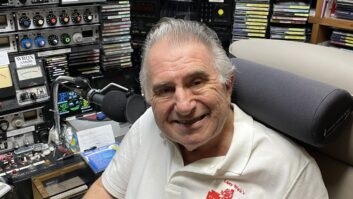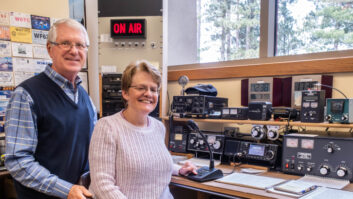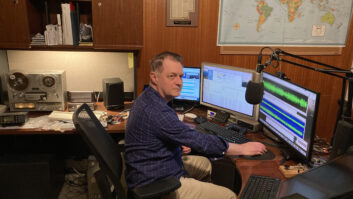The Hindenburg: 75 Years Later
May 1, 2012 2:00 AM, By Erin Shipps, senior associate editor

Only 75 years ago Herbert Morrison gave the country it’s first taste of “live reporting” when his emotional account of the German passenger airship LZ 129 Hindenburg disaster was aired on WLS Chicago on May 7, 1937, the day after the tragic fire aboard the zepplin.
The ship was attempting to dock with its mooring mast at the Lakehurst Naval Air Station, adjacent to the borough of Lakehurts, New Jersey. There were 97 people on board (36 passengers and 61 crew); 36 people lost their lives that day, including one death among the ground crew.
The actual cause of the fire remains unknown, although a variety of hypotheses have been put forward.

Herbert Morrison
The disaster was well recorded because of the extent of newsreel coverage and photographs, as well as Morrison’s eyewitness radio report. This being the first transatlantic passenger flight of the year by Zeppelin to the United States, there were many journalists at the landing. The fire and its coverage shattered public confidence in the giant, passenger-carrying airship and marked the end of the airship era.
Wikipedia: “Morrison’s broadcast remains one of the most famous in history. Parts of it were later dubbed onto the newsreel footage, giving the impression that the words and film were recorded together. Part of the poignancy of his commentary is due to its being recorded at a slightly slower speed, so that when it is played back at normal speed, it seems to have a faster delivery and higher pitch. When corrected, his account is less frantic sounding, though still impassioned.”
Morrison’s broadcast: “It’s practically standing still now they’ve dropped ropes out of the nose of the ship; and (uh) they’ve been taken ahold of down on the field by a number of men. It’s starting to rain again; it’s… the rain had (uh) slacked up a little bit. The back motors of the ship are just holding it (uh) just enough to keep it from…It’s burst into flames! It’s burst into flames and it’s falling it’s crashing! Watch it; watch it! Get out of the way; Get out of the way! Get this, Charlie; get this, Charlie! It’s fire… and it’s crashing! It’s crashing terrible! Oh, my! Get out of the way, please! It’s burning and bursting into flames and the… and it’s falling on the mooring mast. And all the folks agree that this is terrible; this is the one of the worst catastrophes in the world. [indecipherable] its flames… Crashing, oh! Four- or five-hundred feet into the sky and it… it’s a terrific crash, ladies and gentlemen. It’s smoke, and it’s in flames now; and the frame is crashing to the ground, not quite to the mooring mast. Oh, the humanity! And all the passengers screaming around here. I told you; it — I can’t even talk to people, their friends are out there! Ah! It’s… it… it’s a… ah! I… I can’t talk, ladies and gentlemen. Honest: it’s just laying there, mass of smoking wreckage. Ah! And everybody can hardly breathe and talk and the screaming. 0000000, I… I… I’m sorry. Honest: I… I can hardly breathe. I… I’m going to step inside, where I cannot see it. Charlie, that’s terrible. Ah, ah… I can’t. Listen, folks; I… I’m gonna have to stop for a minute because [indecipherable] I’ve lost my voice. This is the worst thing I’ve ever witnessed.”
– Herbert Morrison, describing the events, as transcribed for broadcast by WLS radio.
Information from Wikipedia
May 2012
Inside Dial Global’s radio network, audio production from the field, prior coordination for STLs, a Field Report on the IsoAcoustics ISO-L8R and budget mics for remotes….












